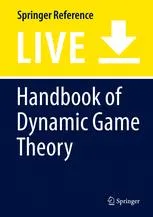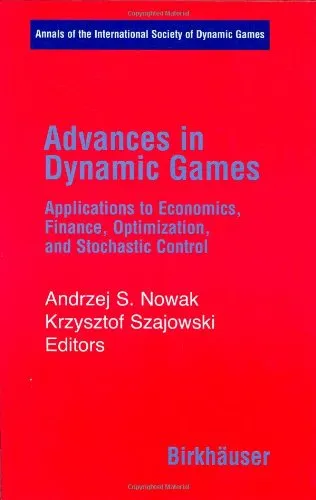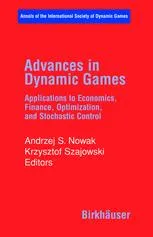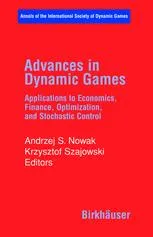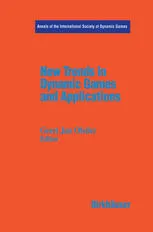Handbook of Dynamic Game Theory
4.5
Reviews from our users

You Can Ask your questions from this book's AI after Login
Each download or ask from book AI costs 2 points. To earn more free points, please visit the Points Guide Page and complete some valuable actions.Related Refrences:
Introduction
The Handbook of Dynamic Game Theory, edited by Tamer Başar and Georges Zaccour, stands as a definitive resource for scholars, researchers, and practitioners in game theory, operations research, control systems, economics, and applied mathematics. Dynamic game theory serves as an essential analytical framework to understand decision-making processes in dynamic, interactive environments. With contributions from some of the world’s most renowned scholars in the field, this book provides comprehensive insights into the methodologies, applications, and theoretical foundations of dynamic games, making it an invaluable asset for academics and industry professionals alike.
The handbook covers a diverse range of topics, from foundational concepts to advanced applications. Whether you're exploring the role of Nash equilibria in multi-agent systems or applying game-theoretic models to real-world scenarios like climate agreements, cybersecurity, or economics, this book offers both the depth and breadth necessary for a profound understanding of the field. Its interdisciplinary and forward-looking approach ensures its relevance across numerous domains.
Detailed Summary of the Book
The Handbook of Dynamic Game Theory is designed to offer an in-depth exploration of dynamic interactions over time, emphasizing strategic decisions and their impact across various disciplines. Split into numerous chapters contributed by esteemed researchers, the book covers both cooperative and non-cooperative games, presenting key mathematical models and solution techniques.
The first sections of the book provide foundational knowledge, introducing readers to dynamic games, key mathematical tools, and their theoretical underpinnings. Subsequent chapters delve into methodological advancements in areas like differential games, stochastic games, and evolutionary game theory. Particularly significant is the focus on computational tools for solving complex problems, a critical need in today’s technological age.
The book also showcases practical applications, exploring case studies in economics, environmental management, bioengineering, and multi-agent systems. These real-world examples highlight the growing utility of dynamic game theory to address contemporary challenges like resource allocation, policy formulation, and conflict resolution. Moreover, the handbook pushes the boundaries of the field by addressing cutting-edge research topics, from mean-field theory to applications in AI-driven systems.
Key Takeaways
- Comprehensive coverage of both foundational and advanced topics in dynamic game theory.
- Insights into modern applications of game theory, including sustainability, machine learning, and network security.
- Detailed explanations of solution techniques for non-cooperative, cooperative, stochastic, and evolutionary games.
- Contributions from leading experts worldwide, ensuring quality and breadth of knowledge.
- Essential mathematical tools and algorithms for dynamic game modeling.
Famous Quotes from the Book
"Dynamic game theory transcends mathematics; it offers a lens to analyze and shape the ever-changing strategic interactions that drive our world."
"The power of dynamic games lies in their ability to model not only strategies but also the evolution of beliefs, preferences, and external conditions over time."
"Collaboration and competition are two sides of the same coin; dynamic game theory provides the tools to flip it."
Why This Book Matters
The Handbook of Dynamic Game Theory is not just a collection of academic theories or mathematical proofs; it is a gateway to understanding the complexities of strategic decision-making in a dynamic world. As the world grows increasingly interconnected, the importance of modeling interactive, time-sensitive behaviors becomes crucial. This book addresses such challenges by offering both theoretical insights and practical tools.
Furthermore, the interdisciplinary nature of this handbook makes it indispensable for researchers across fields. Economists can decode bargaining and market behaviors, engineers can optimize multi-agent systems, and policymakers can devise strategies for conflict resolution and environmental sustainability. The handbook’s coverage of emerging fields such as AI, machine learning, and computational economics ensures that it remains relevant as technology and global challenges evolve.
In summary, the Handbook of Dynamic Game Theory is a cornerstone work that not only advances academic discourse but also contributes meaningfully to solving real-world issues in our fast-paced, dynamic environment.
Free Direct Download
You Can Download this book after Login
Accessing books through legal platforms and public libraries not only supports the rights of authors and publishers but also contributes to the sustainability of reading culture. Before downloading, please take a moment to consider these options.
Find this book on other platforms:
WorldCat helps you find books in libraries worldwide.
See ratings, reviews, and discussions on Goodreads.
Find and buy rare or used books on AbeBooks.
1666
بازدید4.5
امتیاز0
نظر98%
رضایتReviews:
4.5
Based on 0 users review
Questions & Answers
Ask questions about this book or help others by answering
No questions yet. Be the first to ask!
